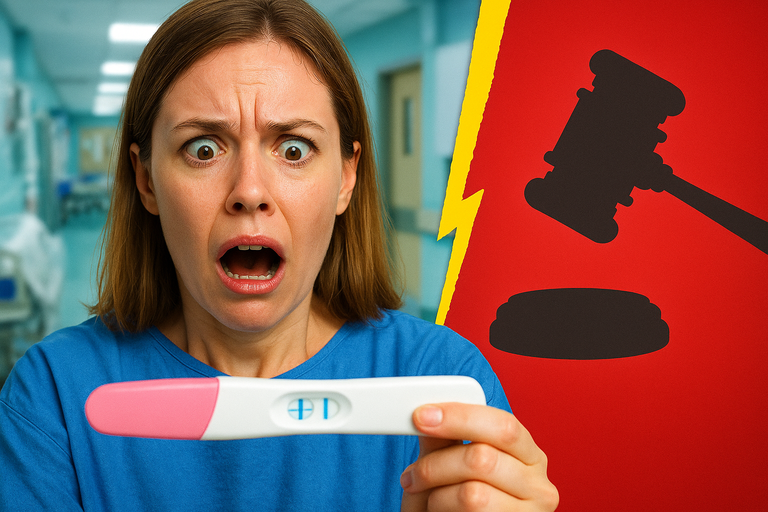
I never thought I'd have to worry about what would happen if I needed emergency care while trying to conceive. But after reading the recent news about the Trump administration rolling back hospital abortion protections for pregnant patients, I'm honestly shaken—and I know I'm not alone.
Earlier this week, I read this ABC News article about the Trump administration's decision to rescind Biden-era guidance requiring hospitals to stabilize patients by performing abortions—in situations where it's medically necessary. At first, it sounded like another headline in a long list of policy changes, but then it hit me: what does this mean for people like us, who are hoping to grow our families?
If you’re on the conception journey, chances are you’ve already ridden the emotional rollercoaster of fertility. From meticulously timing ovulation to debating the magical powers of pineapple core, there’s so much we grapple with. The last thing anyone needs is more uncertainty around emergency medical care. But here we are.
What’s Actually Changing? And Should We Be Worried?
Let’s break this down, because I know legal jargon makes my eyes glaze over too. Under the previous guidance, hospitals were required to provide life-saving abortions if a pregnant patient was in danger. Now, with these protections rolled back, the responsibility is blurred—and so is our sense of safety.
Let’s be real: most of us never imagine we’ll need an emergency abortion. But things like ectopic pregnancies or life-threatening complications are rare, not impossible. If hospitals can now legally hesitate or refuse care, that’s a whole new layer of anxiety for anyone hoping to conceive or carry a pregnancy.
Does this mean every hospital is suddenly unsafe? No. But it does mean that access to emergency reproductive care could change depending on your ZIP code, hospital policy, or even the beliefs of the healthcare staff on duty. And in moments that require quick, expert action, those minutes and decisions matter—a lot.
How Policy Shapes Our Emotional Wellness
If you’ve ever panicked at a tiny spot of blood during your two-week wait, you know how fast fear can spiral. Now, add the uncertainty of whether your local hospital will actually help you in an emergency. This isn’t just a policy change; it’s an emotional sucker punch.
A lot of us plan for everything: prenatal vitamins, fertility diets, temperature charts, even backup sperm. But how many of us have a hospital policy checklist as part of our birth plan? Should we have to?
It’s easy to feel powerless. But understanding what’s happening—and how it might impact us—is the first step toward regaining control.
What Can We Do to Protect Ourselves Right Now?
Here’s what I’m doing, and what I’d encourage every reader to consider:
- Research your local hospitals: Yep, it’s awkward. But ask what their emergency reproductive care policies are. If possible, choose a provider who supports your values.
- Build your support network: Whether it’s friends, family, or a local pregnancy group, know who you can call if things get scary. Emotional backup is everything.
- Advocate for yourself: If you’re nervous about appointments, write down your questions. Ask directly about emergency care scenarios, even if it feels uncomfortable.
- Consider at-home options: Many people are exploring conception at home, and while this doesn’t eliminate medical emergencies, it puts more of the process in your hands. For example, MakeAMom’s home insemination kits are designed with privacy, accessibility, and user empowerment in mind. Their focus on user education and discretion is making a real difference for folks who value autonomy.
Why This Hits Different in 2025
It’s 2025, and we’ve all watched reproductive rights become a political battleground. Many readers have messaged me, worried about starting their fertility journey at such an uncertain time. I get it. In fact, I’m right there with you. All the yoga, pineapple smoothies, and cycle charts in the world don’t calm the worry over what might happen if we actually get pregnant and need help.
But that’s why it’s more important than ever to be proactive—not just about ovulation windows, but about the bigger picture. Knowing your options, building your community, and choosing solutions that center your well-being are quietly radical acts these days.
A Final Thought: Empowerment in an Uncertain World
I don’t have all the answers. None of us do. But I believe staying informed and supporting each other is how we keep moving forward. Whether you’re tracking your cycles, considering at-home insemination, or just daydreaming about baby names, your hope (and your safety) matters.
So let’s keep talking—about policy, about wellness, about all the weird, wonderful details of trying to conceive in complicated times. Because our choices, our voices, and our journeys deserve respect.
How are you feeling about all this? Have recent events changed your plans or mindset? Drop a comment—I’d love to hear from you. And remember: you’re not alone on this path.